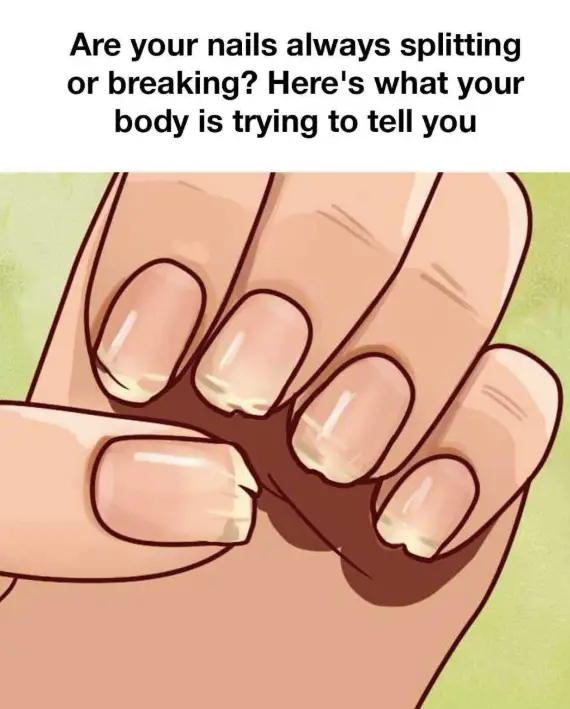
Healthy nails are more than just an aesthetic feature—they reflect your internal health. Changes in the texture, color, strength, or shape of your nails can indicate nutritional deficiencies, environmental stresses, underlying health conditions, or lifestyle factors. Paying attention to these signs can help you address potential problems early.
1. Nutritional Deficiencies
Biotin (Vitamin B7) Deficiency:
Biotin is essential for the formation of keratin, the protein that makes up your nails, skin, and hair. A lack of biotin often results in brittle, thin, or splitting nails. Common dietary sources of biotin include eggs, almonds, cauliflower, cheeses, mushrooms, sweet potatoes, and spinach. Supplementing biotin under medical advice can also be helpful in some cases.
Iron Deficiency:
Iron plays a vital role in producing hemoglobin, which transports oxygen in your blood. Insufficient oxygen delivery to nail cells can cause nails to become weak, brittle, or develop abnormal shapes such as spooning (koilonychia). Iron-rich foods include red meat, spinach, lentils, fortified cereals, and beans. Women, especially those with heavy menstrual cycles, are often at higher risk of iron deficiency.
Insufficient Protein Intake:
Nails are primarily composed of keratin, a structural protein. Without adequate protein intake, nail growth slows, and nails can become weak and prone to breaking. Including lean meats, fish, poultry, legumes, dairy products, and plant-based protein sources in your diet supports nail health.
2. Hydration
Dehydration affects the entire body, including your nails. Nails that lack moisture become brittle and prone to cracking or splitting. Drinking sufficient water daily and using moisturizing creams or oils on your hands and nails can maintain flexibility and strength.
3. Environmental Factors
Chemical Exposure:
Frequent contact with harsh cleaning products, detergents, or nail polish removers containing acetone can strip natural oils from nails, weakening them over time. Wearing gloves while doing household chores and opting for gentler, acetone-free nail care products can help protect nails.
Weather Conditions:
Cold, dry weather removes moisture from nails and surrounding skin, leading to dryness and brittleness. Regular use of hand creams and protective gloves during cold seasons can reduce damage.
4. Underlying Health Conditions
Thyroid Disorders:
Both hypothyroidism (underactive thyroid) and hyperthyroidism (overactive thyroid) can lead to brittle, slow-growing nails or other nail abnormalities. If nail changes are accompanied by fatigue, weight changes, or mood disturbances, it is advisable to seek medical evaluation, including thyroid function tests.
Psoriasis:
This autoimmune skin condition can affect nails, causing pitting, thickening, discoloration, and splitting. Nail psoriasis can be painful and difficult to manage without proper dermatological treatment.
Fungal Infections:
Fungal infections often cause nails to thicken, discolor (yellow or white spots), become brittle, or crumble. These infections may require topical or oral antifungal medications, depending on severity.
5. Physical Trauma and Habits
Repeated trauma to the nails—such as using them to pry objects, biting, or aggressive manicuring—can cause damage and increase brittleness. Keeping nails trimmed short, filing gently, and avoiding using nails as tools helps maintain their integrity.
6. Age-Related Changes
As people age, nails naturally become drier and more brittle due to decreased oil production and slower cell turnover. Dietary adjustments to include omega-3 fatty acids (found in fish, flaxseeds, and walnuts) and collagen-supporting foods (such as bone broth and vitamin C-rich fruits) can support nail health. Regular moisturizing also helps counteract dryness.
When to Seek Medical Advice
If you notice persistent or severe changes in your nails, especially if accompanied by other symptoms such as fatigue, skin changes, or hair loss, it is important to consult a healthcare professional. Early diagnosis of underlying conditions can prevent further complications.
Summary
Nails offer valuable insights into your overall health. Maintaining a balanced diet rich in key nutrients, protecting your nails from environmental damage, staying well-hydrated, and managing any health conditions are all crucial steps to keeping your nails strong and healthy. Paying attention to these signals can help you take proactive measures for your broader well-being.




